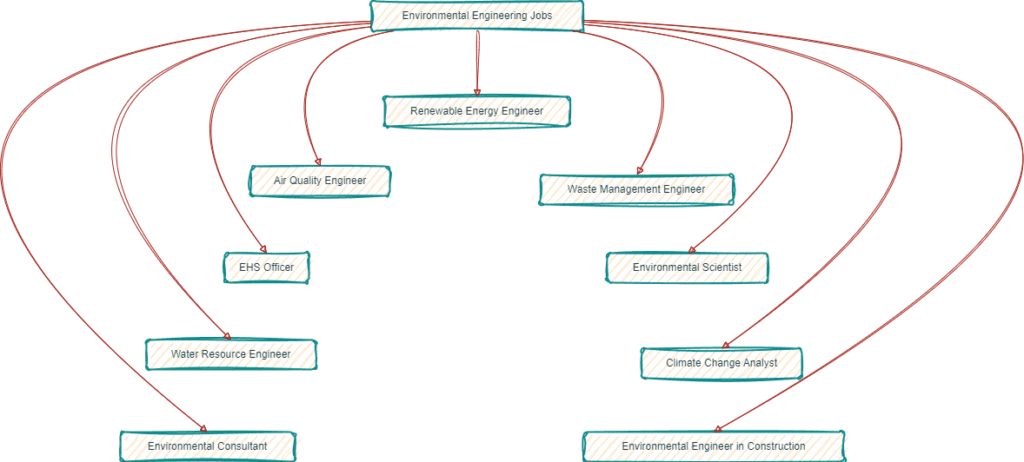Discover the Top Environmental Engineering Jobs in 2024 and Beyond
Introduction
Environmental engineering is a rapidly evolving field that addresses some of the most pressing issues of our time, including climate change, pollution, and sustainable resource management. As we move into 2024 and beyond, the demand for skilled environmental engineers is expected to grow significantly. This article will explore the top environmental engineering jobs, the skills required, and the future outlook for this essential profession.

The Importance of Environmental Engineering
Environmental engineering plays a crucial role in protecting our planet and ensuring a sustainable future. This field combines principles of engineering, biology, and chemistry to develop solutions for environmental problems. Environmental engineers work on projects related to water and air quality, waste management, and renewable energy, among others.
Key Areas of Focus
- Water Resources Management: Ensuring clean and safe water supply.
- Air Quality Control: Reducing air pollution and improving air quality.
- Waste Management: Developing efficient waste disposal and recycling systems.
- Renewable Energy: Promoting the use of sustainable energy sources.
- Environmental Impact Assessment: Evaluating the environmental impact of construction and industrial projects.
Top Environmental Engineering Jobs in 2024 and Beyond
1. Water Resources Engineer
Water resources engineers focus on the management and distribution of water resources. They design and implement systems for water supply, wastewater treatment, and flood control. With increasing concerns about water scarcity and quality, this role is becoming more critical.

Key Responsibilities
- Designing water treatment plants
- Developing flood control systems
- Managing water distribution networks
- Conducting hydrological studies
Required Skills
- Proficiency in hydrology and hydraulics
- Knowledge of water treatment processes
- Strong analytical and problem-solving skills
- Experience with GIS and modeling software
2. Air Quality Engineer
Air quality engineers work to improve air quality by developing systems to reduce emissions from industrial processes, vehicles, and other sources. They also monitor air quality and ensure compliance with environmental regulations.

Key Responsibilities
- Designing air pollution control systems
- Monitoring air quality levels
- Conducting emissions testing
- Ensuring compliance with environmental regulations
Required Skills
- Understanding of atmospheric science
- Knowledge of air pollution control technologies
- Proficiency in data analysis and modeling
- Strong communication skills
3. Waste Management Engineer
Waste management engineers develop and implement systems for the collection, transportation, and disposal of waste. They also work on recycling and waste-to-energy projects to minimize environmental impact.

Key Responsibilities
- Designing waste management systems
- Developing recycling programs
- Implementing waste-to-energy projects
- Conducting environmental impact assessments
Required Skills
- Knowledge of waste management technologies
- Proficiency in environmental impact assessment
- Strong project management skills
- Experience with regulatory compliance
4. Renewable Energy Engineer
Renewable energy engineers focus on the development and implementation of sustainable energy sources, such as solar, wind, and bioenergy. They work on projects to reduce reliance on fossil fuels and promote clean energy.

Key Responsibilities
- Designing renewable energy systems
- Conducting feasibility studies
- Implementing energy efficiency projects
- Promoting sustainable energy practices
Required Skills
- Knowledge of renewable energy technologies
- Proficiency in energy modeling and simulation
- Strong analytical and problem-solving skills
- Experience with project management
5. Environmental Impact Assessor
Environmental impact assessors evaluate the potential environmental effects of proposed construction and industrial projects. They conduct studies and prepare reports to ensure that projects comply with environmental regulations.

Key Responsibilities
- Conducting environmental impact studies
- Preparing environmental impact reports
- Ensuring compliance with regulations
- Recommending mitigation measures
Required Skills
- Proficiency in environmental impact assessment
- Strong research and analytical skills
- Knowledge of environmental regulations
- Excellent communication skills
Emerging Trends in Environmental Engineering
1. Climate Change Mitigation
As the effects of climate change become more apparent, environmental engineers are increasingly focused on developing solutions to mitigate its impact. This includes designing resilient infrastructure, promoting sustainable practices, and reducing greenhouse gas emissions.
2. Sustainable Urban Development
With the global population continuing to grow, sustainable urban development is becoming a priority. Environmental engineers are working on projects to create green cities, improve public transportation, and promote energy-efficient buildings.
3. Advanced Waste Management Technologies
Advancements in waste management technologies are helping to reduce the environmental impact of waste. This includes the development of smart waste collection systems, improved recycling processes, and innovative waste-to-energy solutions.
4. Water Scarcity Solutions
Water scarcity is a growing concern in many parts of the world. Environmental engineers are developing innovative solutions to address this issue, such as desalination, water recycling, and efficient irrigation systems.
5. Renewable Energy Innovations
The renewable energy sector is experiencing rapid advancements, with new technologies emerging to harness energy more efficiently and sustainably. Environmental engineers are at the forefront of these innovations, working on projects that range from large-scale solar farms to small, decentralized wind turbines.
Key Innovations
- Solar Power: Development of high-efficiency photovoltaic cells and solar thermal systems.
- Wind Energy: Advancements in turbine design and offshore wind farms.
- Bioenergy: Utilization of organic waste to produce biofuels and biogas.
- Hydropower: Implementation of small-scale hydroelectric systems and improvements in dam efficiency.
Skills and Education for Environmental Engineers
Educational Requirements
To pursue a career in environmental engineering, a bachelor’s degree in environmental engineering or a related field is typically required. Advanced positions may require a master’s degree or Ph.D. in a specialized area of environmental engineering.
Essential Skills
- Technical Proficiency: Knowledge of engineering principles, environmental science, and relevant technologies.
- Analytical Skills: Ability to analyze data, conduct research, and solve complex problems.
- Project Management: Experience in managing projects, including budgeting, scheduling, and resource allocation.
- Communication: Strong written and verbal communication skills to convey technical information to diverse audiences.
- Regulatory Knowledge: Understanding of environmental laws and regulations.
Certifications and Professional Development
Obtaining certifications such as the Professional Engineer (PE) license or certifications from organizations like the American Academy of Environmental Engineers and Scientists (AAEES) can enhance career prospects. Continuous professional development through workshops, seminars, and courses is also essential to stay updated with industry trends and advancements.
Future Outlook for Environmental Engineering Jobs
Job Growth and Demand
The demand for environmental engineers is expected to grow significantly in the coming years. According to the U.S. Bureau of Labor Statistics, employment of environmental engineers is projected to grow by 5% from 2020 to 2030, faster than the average for all occupations. This growth is driven by increased awareness of environmental issues and the need for sustainable solutions.
Emerging Opportunities
- Green Building Design: Environmental engineers will play a crucial role in designing energy-efficient and sustainable buildings.
- Climate Resilience: Developing infrastructure and systems to withstand the impacts of climate change.
- Environmental Consulting: Providing expertise to businesses and governments on environmental compliance and sustainability practices.
- Technology Integration: Utilizing advanced technologies such as artificial intelligence and the Internet of Things (IoT) to enhance environmental monitoring and management.
Conclusion
Environmental engineering is a dynamic and impactful field that offers numerous opportunities for those passionate about protecting the environment and promoting sustainability. As we move into 2024 and beyond, the role of environmental engineers will become increasingly vital in addressing global challenges such as climate change, resource scarcity, and pollution. By staying informed about emerging trends and continuously developing their skills, environmental engineers can make significant contributions to creating a sustainable future.
Frequently Asked Questions (FAQ)
1. What is the primary role of an environmental engineer?
Environmental engineers use principles of engineering, biology, and chemistry to develop solutions for environmental problems. They work on projects related to water and air quality, waste management, and renewable energy, among others.
2. What skills are essential for a career in environmental engineering?
Key skills include technical proficiency, analytical abilities, project management, strong communication, and knowledge of environmental regulations. Continuous professional development and certifications can also enhance career prospects.
3. What are the emerging trends in environmental engineering?
Emerging trends include climate change mitigation, sustainable urban development, advanced waste management technologies, water scarcity solutions, and innovations in renewable energy.
4. What educational background is required to become an environmental engineer?
A bachelor’s degree in environmental engineering or a related field is typically required. Advanced positions may require a master’s degree or Ph.D. in a specialized area of environmental engineering.
5. What is the future outlook for environmental engineering jobs?
The demand for environmental engineers is expected to grow significantly, driven by increased awareness of environmental issues and the need for sustainable solutions. Emerging opportunities include green building design, climate resilience, environmental consulting, and technology integration.
For more information on environmental engineering careers and trends, visit Environmental Engineering Careers.
Additional Resources
- American Academy of Environmental Engineers and Scientists (AAEES)
- Environmental Protection Agency (EPA)
- National Society of Professional Engineers (NSPE)
- Renewable Energy World
By exploring these resources and staying informed about industry developments, aspiring environmental engineers can build a successful and impactful career in this vital field.


